We are continually trying to improve are waste management and recycling rates here at the University of Greenwich.
Our key achievements
- We launched our Clothing Swap initiative in 2023.
- Thanks to our Furniture Reuse Scheme - we saved £130,000 by relocating 900 items across the University. We also donated £60,000 worth of furniture to external organisations.
- Since 2018, our End of Term Reuse Campaign has raised a total of £70,000 for the British Heart Foundation: 5,000 bags of items have been donated. In 2022 alone, our students donated 1,627 bags of items through the campaign, raising £45,000.
- At our Medway campus 'Bargain Corner', we sold over 4,000 discounted items to students in the last two years.
Waste impacts us all, and from the individual to large business, everyone produces it. On average, each person in the UK throws away their own body weight in waste every seven weeks and the average household in the UK produces more than a tonne of waste every year! Whilst a proportion of waste is unavoidable, there is significant amount of waste which is produced unnecessarily due to the overconsumption of items.
Our generation has significantly reduced over the years; from an annual average of 1,100 tonnes during the first 7 years from a 2009/10 baseline to under 700 tonnes from the next 7 years to 2022/23 (not including construction waste) and is equivalent to 200 African Elephants!
Our KPI recycling rate target is 70% (matching what is estimated to be the amount of typical waste that can be recycled). Despite our generation of waste falling over the past seven years however, our recycling rate currently sits at 36% (2022-23) which demonstrates the challenges associated with best practice education and developing new processes. Our central waste collector (Suez) have a zero waste to landfill approach, with all general waste being sent for Refuse Derived Fuel (RDF); incinerated for the creation of energy.

Waste Action Plan & Projects
Our Waste Action Plan is ambitious and lays out adaptable targets and steps over the next five years to suit the University’s changing business needs and performance whilst meeting the overarching objective supported in our Sustainability Policy to meet and exceed our 70% recycling rate KPI. Legal compliance is a necessity and will continue to be managed through the Environmental Management System (EMS).
The below examples are of the initiatives, innovations and collaborations taken by our students and staff to push towards waste reduction and a circular economy approach in all activities.
- The Reuse Race - a student lead initiative tackling disposable cups in our food outlets.
- Removing the Disposable Cup - listening to our students, how we are removing the disposable cup from our food outlets.
- End of Term Reuse - a student managed project collecting student donations for charity to tackle end of term waste.
- Furniture Reuse at Greenwich - how we are sharing and relocating quality items of furniture around the campuses.
Putting it in the Right Bin
Around campus you should see waste posters on each bin, whether in a teaching building or halls of residence. These have been designed to convey what should and should not be placed into each bin in a simple and visual manner. Communications from the Sustainability Team will also be sent periodically, to both students and staff to remind of best practice and to find out if there are any specifically problem areas of issues occurring.
Watch the video to understand why recycling is so important, with our own waste collectors Suez and interviewed by Hubbub.
Mixed Recycling Bins
- Drink cans and food tins (empty)
- Paper and magazines
- Drink and milk bottles
- Tin foil (scrunched) and containers
- Cardboard
- Plastics 1,2 and 3. Check the small triangle (found commonly on the item’s bottom)
All items must be clean. No other items should be placed in the bin. Wash items before throwing.
Clear sacks MUST be used in internal recycling bins. This helps to spot any contamination. If there is too much other waste or items not clean, then the bag has to be disposed of as general waste. The University is liable for contamination fines.
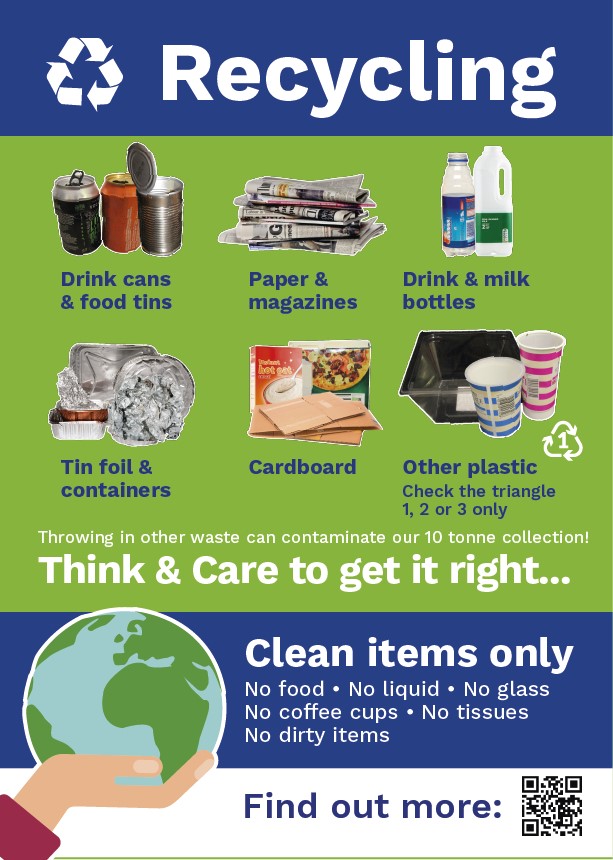
General Waste Bins
- Coffee cups
- Food leftovers (if a food bin is not nearby)
- Food packets and wrappers
- Tissues and paper towels
- Polystyrene and hard plastics (4,5,6 and 7 Check the small triangle found commonly on the item’s bottom)
- Dirty packaging
Remember to check to see if it can be recycled.
Black sacks MUST be used in internal waste bins. This helps in identifying the generate waste and recycling waste. General waste is sent to incineration facilities and burnt to generate electricity. No waste is sent to landfill.
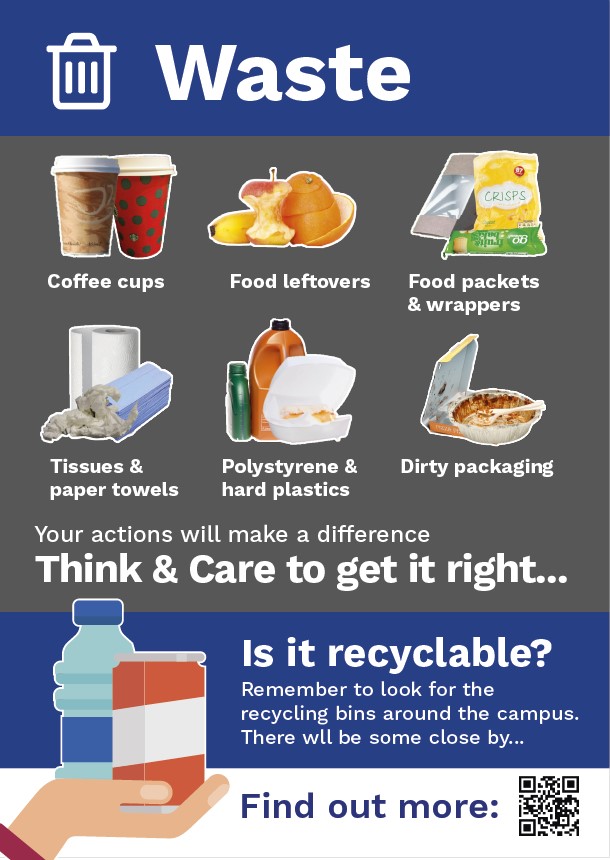
Food Waste Bins
- All cooked and raw leftovers
- Small bones
- Tea bags and coffee grounds
Food waste bins are only found in the café and eating outlet areas at each campus.
Clear sacks MUST be used in internal food waste bins. This helps to spot any contamination.
Food waste is sent for anaerobic digestion and turned to compost. If the waste is contaminated it will cause issues and we can be liable for contamination fines.
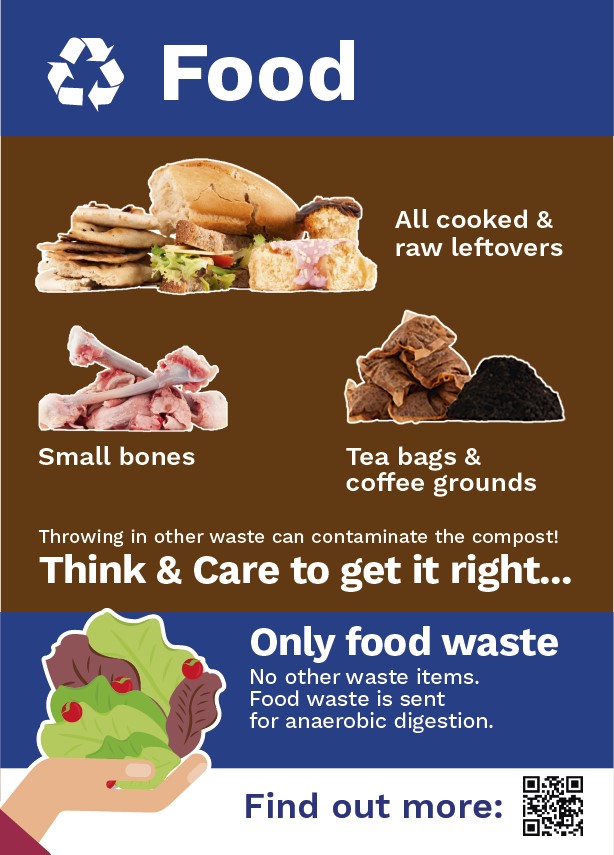
Glass Waste Bins
- Glass bottles and jars – any colour
- All items must be clean.
- No drinking glasses or broken glass.
Glass bins are located within the waste compounds across each campus, with dedicated glass bags/bins within the halls of residence to be moved and collected outside. Glass is recycled.
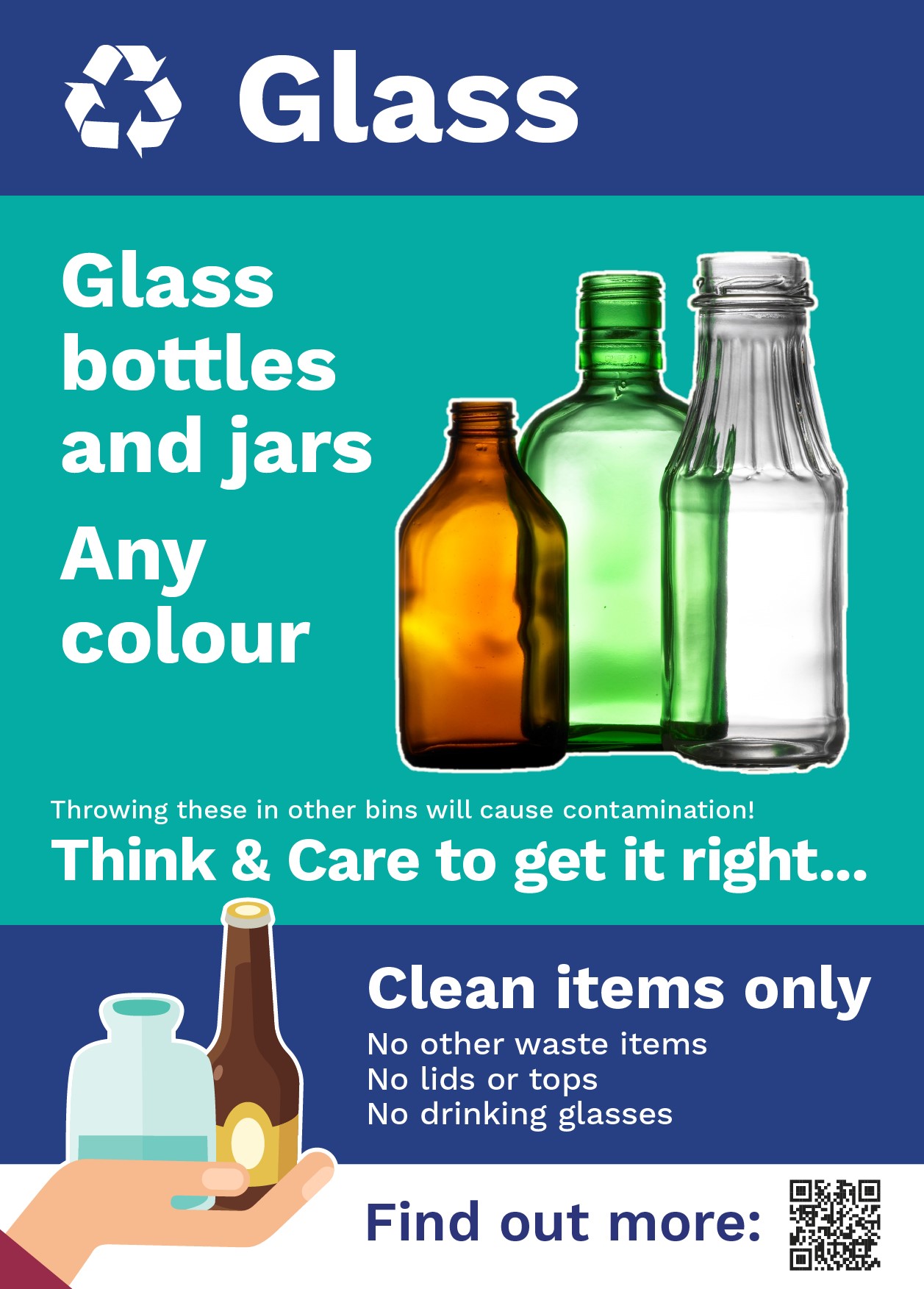
Battery Waste Bins
Assorted household batteries only
Battery bins are located in a variety of places around the campuses (i.e., Dreadnought and Queen Anne at Greenwich, The Dome, Accommodation Office and FM Office at Avery Hill, and Pembroke, Drill Hall Library and Hawke at Medway).
Batteries are specially collected once the bins are full and are recycled.
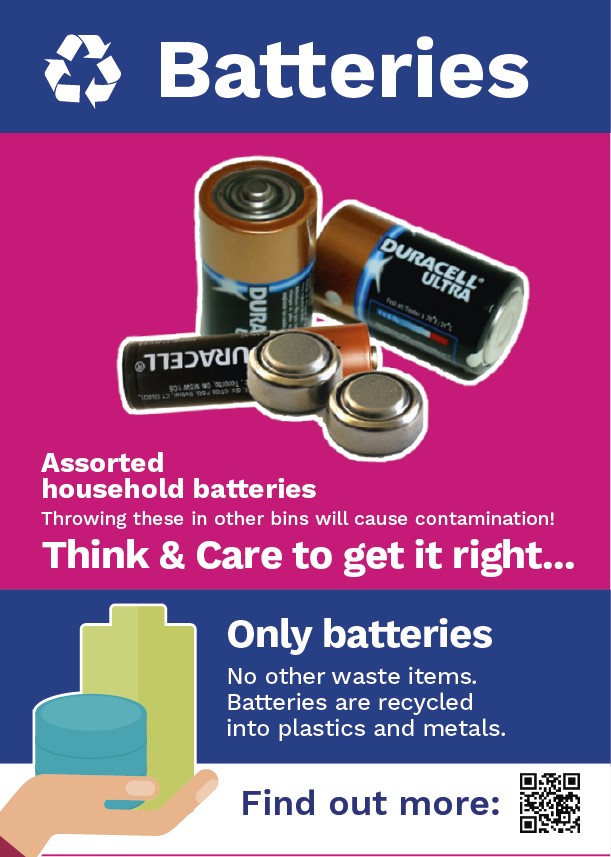
There are some additional types of waste that are typically generated through specific operations or activities across the campuses.
- Clinical/Sanitary waste is kept in secure compounds in yellow bins.
- Garden and wood waste is kept in collection skips.
- Electrical waste (WEEE) is kept in secure compounds.
- Confidential waste is kept in secured bins or bags.
- Metal waste is kept in collection skips.
- Bulky waste is kept in collection skips and are items that do not fit elsewhere i.e., mattresses etc.